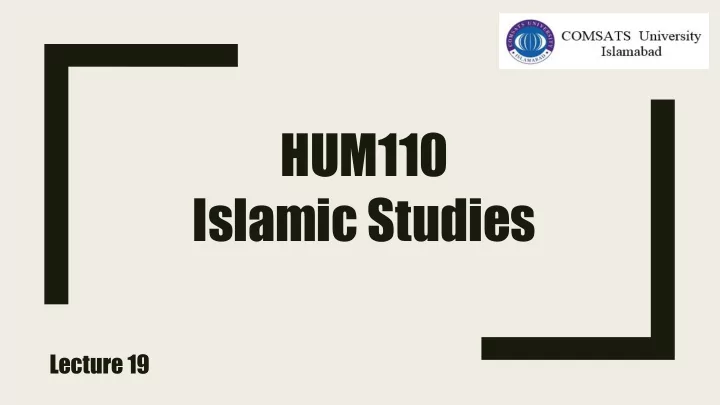

HUM110 Islamic Studies Lecture 1 9
Ummayids & Abbasids The rise and fall of leaders
The Rightly Guided Caliphs The empire expanded under the next caliphs
The Rightly Guided Caliphs • During the Rightly Guided Caliphates, the Islamic Empire expanded “Dar-al- Islam” (the areas where Islam is practiced) • The caliphs used the Shari'ah (laws of Islam) to govern the empire. • The caliphate never forced non-Muslims to convert, especially “People of the Book” & allowed religious tolerance as long as taxes were paid to the empire.
REGIONS OF UMMAYID CALIPHATE • Mesopotamia • North Africa • Spain • Crete, Sicily, and Sardinia • Northwest India • Dominated eastern Mediterranean Sea • Capital at Damascus
The Umayyad Empire The Umayyads expanded the empire which brought wealth & new Islamic converts
NOTABLE CALIPH OF THE UMMAYIDS • Only Umayyad ruler (Caliphs of Damascus), Umar ibn Abd al- Aziz , is unanimously praised for his devout piety and justice. • In his efforts to spread Islam he established liberties by abolishing the jizya tax for converts to Islam. • Imam Abu Muhammad Adbullah ibn Abdul Hakam stated that Umar ibn Abd al-Aziz also stopped the personal allowance offered to his relatives stating that he could only give them an allowance if he gave an allowance to everyone else in the empire. • Umar ibn Abd al-Aziz was later poisoned in the year 720. When successive governments tried to reverse Umar ibn Abd al-Aziz's tax policies it created rebellion.
DECLINE OF UMMAYID CALIPHATE • Umayyad became soft and corrupt due to increasing wealth and power • Warrior lifestyle declined • Decadent living sparked revolts • Indian frontier - warrior settlers revolted under banner of Abbasid party • 750 CE victory over Umayyads • Grandson of Umayyad caliph escaped to Spain- founded Caliphate of Cordoba
In 750, the Umayyad Empire was overthrown by the Abbasids
RISE OF ABBASID CALIPHATE • The period from 786 to 861 is said to be the peak of Abbasid rule. • The empire reached great cultural heights during this time. • In 813-833 while al-Ma'mun was in power, he put down many rebellions and fought wars with the Byzantine Empire.
The Abbasid Empire The Abbasid Empire (750 to 1258): • 1. The Abbasid caliphate built a strong government bureaucracy to rule their empire 2. Muslim merchants expanded wealth by trading across Africa, Indian Ocean and Mediterranean Sea
The Abbasid Empire • Built centralized state- absolute power • Capital at Baghdad • Bureaucracy under Wazir • Royal executioner • Revenues in form of tribute and taxes • Abbasids grew less powerful at distance • Caliphs placed themselves above Islamic law • Caliphs became remote from people
The Abbasid Empire Wealth from trade led to a golden age, a time of great Muslim achievements in science, math, medicine, & architecture.
Bayt al-Hikmah The House of Wisdom (Bayt al-Hikmah) refers either to a major Abbasid public academy and intellectual center in Baghdad or to a large private library belonging to the Abbasid Caliphs during the Islamic Golden Age. The House of Wisdom is the subject of an active dispute over its functions and existence as a formal academy, an issue complicated by a lack of physical evidence following the collapse of the Abbasid Caliphate and a reliance on corroboration of literary sources to construct a narrative. The House of Wisdom was founded either as a library for the collections of the Caliph Harun al-Rashid in the late 8th century and later turned into a public academy during the reign of Al- Ma'mun or was a private collection created by Al-Mansur (reign 754-775) to house rare books and collections of poetry in both Arabic and Persian.
THE ISLAMIC GOLDEN AGE Education Biology Law (Jurisprudence) Chemistry Theology al Kindi Ahmad ibn Hanbal Engineering Philosophy Social Sciences - Ibn Ibn Sina & Ibn Rushd Khuldun Metaphysics Healthcare - Ibn Sina Mathematics Surgery - al Zahrawi al Khwarizmi Commerce Scientific Method Travel Astronomy Arts & architecture Physics Literature & poetry al Biruni
Recommend
More recommend